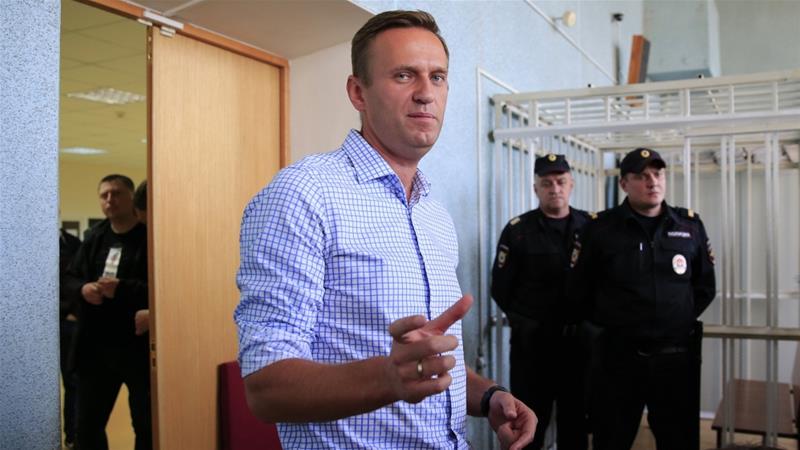Russia's opposition leader Navalny gets 10-day sentence
Long-time Putin critic Alexei Navalny has been jailed over role in unsanctioned Moscow rally held last month.
Russian opposition leader Alexei Navalny has been sentenced to 10 days in jail on charges of taking part in an unsanctioned rally last month.
A Moscow court on Monday found Navalny guilty of violating rules for participating in the June 12 demonstration, at which Russian police detained more than 500 people.
The rally was part of a series of protests sparked by the arrest of a prominent investigative reporter on drug-dealing charges, which were dropped within days for lack of evidence. The case of journalist Ivan Golunov caused outrage, and Russian President Vladimir Putin responded by firing two senior police officers.
“Ten days of detention for a rally against arbitrariness,” Navalny said in a post on Twitter after the verdict. “It’s unpleasant, but I think I did the right thing. If we remain silent and sit at home, the arbitrariness will never stop.”
Navalny, a longtime Putin critic, is the Russian leader’s most visible political foe. He has served numerous jail sentences in recent years for organising anti-government demonstrations.
The European Court of Human Rights in November ruled that Russia’s repeated arrests and detention of Navalny in 2012 and 2014 were politically motivated and breached his human rights. Moscow called the ruling questionable.
During his nearly two decades in power, Putin has silenced most of his critics and sought to muzzle the media.
The 66-year-old won a fourth term in office in a presidential election held last March, enjoying a landslide victory with more than 76 percent of the vote.
He has pledged to respect the Russian constitution, which prohibits anyone from serving more than two consecutive presidential terms, and step down from his post in 2024 when his current term expires.
Putin has stepped down as president once before, in 2008, after serving two back-to-back terms only to return in 2012 after doing a stint as prime minister, a manoeuvre he would be legally entitled to carry out again.
Source: Read Full Article



